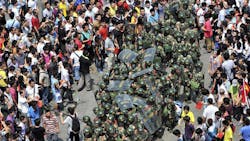Canon, Panasonic Suspend China Operations after Protests
Japanese firms Canon (IW 1000/97) and Panasonic (IW 1000/31) suspended operations at several plants in China on Monday as worries grew over mass anti-Tokyo protests in the world's second biggest economy.
Beijing and Tokyo are at loggerheads over disputed islands in the East China Sea, and in the Japanese capital visiting U.S. Defense Secretary Leon Panetta said Washington was "concerned" by the demonstrations and the conflict.
After meetings in Tokyo with senior Japanese officials, Panetta -- who later travelled on to Beijing -- urged "calm and restraint on all sides," a day after warning "misjudgment on one side or the other could result in violence."
Widespread anti-Japanese protests, some of them violent, have been held across China in recent days over the islands known as Diaoyu by Beijing and Senkaku by Tokyo. They are claimed by both but controlled by Japan.
A new wave of demonstrations is expected Tuesday, the anniversary of the 1931 "Mukden incident" that led to Japan's invasion of Manchuria, which is commemorated every year in China.
Camera and computer printer maker Canon said it had suspended operations at three plants in southern and eastern China for Monday and Tuesday "to ensure the safety of all of our employees working there."
Panasonic said it was halting work at a factory in Qingdao in northeast China "for the time being" after a fire.
Threats of Sanction
China is Japan's biggest trading partner and the stoppages came as the ruling Communist Party's mouthpiece warned Japan's economy could suffer for up to 20 years if Beijing chose to impose sanctions over the territorial row.
A financial spat between Asia's two biggest economies could cast a pall over growth on the continent, which major Western countries are counting on to drive recovery from the global slowdown.
China and Japan have close trade and business ties, with numerous Japanese companies investing in its larger neighbor and two-way trade totaling $342.9 billion last year, according to Chinese figures.
But the two countries' political relationship is often tense due to the territorial dispute and Chinese resentment over past conflicts and atrocities.
The row over the islands intensified last week when the Japanese government bought three of them, effectively nationalizing them, and China responded by sending patrol ships into the waters around them.
After meeting Panetta, Tokyo's Foreign Minister Koichiro Gemba said the anti-Japan demonstrations were "spreading on a scale never seen before."
The U.S. has a mutual defense treaty with Japan and Panetta told reporters Washington's commitment to the arrangement was unwavering.
"Obviously we stand by our treaty obligations. They are longstanding, and that does not change."
But he said the United States as a matter of policy does not take a position on the territorial dispute.
"It's in everybody's interest for Japan and China to maintain good relations and to find a way to avoid further escalation," he said, pounding a podium for emphasis.
Intensified Protests
In Beijing, about 100 protesters in two groups gathered at the Japanese embassy amid heavy security Monday, marching back and forth past the building and occasionally throwing water bottles at it, while an occasional helicopter buzzed overhead.
The embassy urged its citizens to take safety precautions including not going out alone and not speaking loudly in Japanese, consular official Keiji Kamei told AFP.
A commentary in the People's Daily newspaper on the possibility of economic sanctions said: "Amidst a struggle that touches on territorial sovereignty, if Japan continues its provocations China will inevitably take on the fight."
The Japanese economy has already experienced two lost decades from the 1990s and was suffering further weakness in the aftermath of the world financial crisis and 2011 earthquake, it added.
"Japan's economy lacks immunity to Chinese economic measures," the state paper said -- although it added that given the interdependency of the two, sanctions would be a "double-edged sword" for China.
The commentary -- which only appeared in the paper's overseas edition -- said possible targets could include Japan's manufacturing and financial industries, exports and investments in China.
"Strategic material imports" could also be affected, it said, an apparent reference to rare earth metals used in many high-tech products including iPads and iPhones.
"Would Japan rather lose another 10 years and even be ready to fall back 20 years?" it asked.
Japan lost its title as the world's second-biggest economy to China in 2010.
Shares of Chinese companies with business ties to Japanese firms fell in trading in Shanghai as investors sold on worries that the territorial dispute could hurt demand for their products.
- Kelly Olsen, AFP
Copyright Agence France-Presse, 2012
About the Author
Agence France-Presse
Copyright Agence France-Presse, 2002-2025. AFP text, photos, graphics and logos shall not be reproduced, published, broadcast, rewritten for broadcast or publication or redistributed directly or indirectly in any medium. AFP shall not be held liable for any delays, inaccuracies, errors or omissions in any AFP content, or for any actions taken in consequence.
